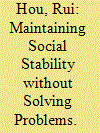| Srl | Item |
| 1 |
ID:
175559


|
|
|
|
|
| Summary/Abstract |
What role do emotions play in state repression? Building upon ethnographic observation in one Beijing petition bureau, this paper explores the emotional labour performed by grassroots officials to demobilize social dissent. The petition system serves as an official channel through which the Chinese government receives complaints and grievances from citizens. Notwithstanding its institutional inefficiency in addressing petitioners’ requirements, this system plays a critical role in maintaining social stability. I investigate the process by which frontline petition officials manage petitions. I argue that channelling petitioners’ emotions has become one of these officials’ core functions. Petition officials have developed three types of emotional strategies – emotional defusing, emotional constraint and emotional reshaping – to absorb petitioners’ complaints. This study of emotional repression offers a fresh perspective on the affective dimension of contentious politics and also contributes to the theoretical discussion on how authoritarian regimes deal with dissent.
|
|
|
|
|
|
|
|
|
|
|
|
|
|
|
|
| 2 |
ID:
153352


|
|
|
|
|
| Summary/Abstract |
The relationship between sex workers and their clients is generally characterized as being based entirely on the direct exchange of sexual favours for money. However, this received wisdom cannot account for a nation such as China which attaches significant value to “face,” social status and interpersonal dignity. This paper draws parallels with high-end sex workers elsewhere in Asia as well as globally. With a focus on the high-end sector, I examine how workers and their clients engage not only in pecuniary transactions but also in genuinely intimate and non-remunerative relationships. High-end sex workers make use of their earned economic capital to acquire cultural capital, and use online apps as marketing tools to target local elites and expats to forge longer-term intimate relationships. Male clients in more commercialized, post-industrial cities in China continue to seek diverse types of sexual experiences, with some clients seeking genuine intimacy. Furthermore, I explore how Chinese and foreign clients overcome social barriers to develop such relationships with sex workers. Building on this sociocultural perspective, this paper analyses ethnographically both sides of the female sex worker–client relationship in high-end karaoke lounges and bars in Dongguan, southern China.
|
|
|
|
|
|
|
|
|
|
|
|
|
|
|
|
| 3 |
ID:
158263


|
|
|
|
|
| Summary/Abstract |
Several decades of economic reform have transformed China into one of the world’s most unequal countries. However, because this inequality has been studied primarily at the structural level, we know little about how it impacts on intimate relationships and affects individuals’ experiences of love and romance. This article engages with this question through a case study of ‘Love on the Assembly Line’, a series of ‘wedding photos’ featuring Chinese rural migrant workers, and the subsequent series of television reports of the same name, dating from 2012–13. It first examines the political-economic context of this minor cultural phenomenon, then examines current contestations over the meaning of love and romance, and finally documents the responses of rural migrant individuals themselves to the project. Combining ethnographic observation, in-depth interviews, and critical discourse analysis, this discussion goes some way towards demonstrating how inequality of emotion can be fruitfully studied, thereby advancing a new and alternative approach to researching inequality in China – one that views love/romance as a cluster of contested cultural narratives and discourses; as a social practice that involves a particular form of distributive injustice; as an integral part of class politics; and as the product of the interaction of these three realms.
|
|
|
|
|
|
|
|
|
|
|
|
|
|
|
|
| 4 |
ID:
178755


|
|
|
|
|
| Summary/Abstract |
This article explores the “ethical labour” of suspension––the conscious effort of deferring one’s ethical judgement and reflections in order to avoid irreconcilable ethical conflicts between one’s present activities and long-term goals. While people engage in ethical judgement and reflections in everyday social interactions, it is the laborious aspect of regulating one’s ethical dispositions that I highlight in the concept of “ethical labour.” Although it cannot be directly commodified, ethical labour is a form of labour as it consumes energy and is integral to the performance of other forms of labour, particularly intimate and emotional ones. This formulation of ethical labour draws on my long-term ethnographic research with a group of young women migrants working as hostesses in high-end nightclubs in southeast China. Many of them perform socially stigmatized work with the goal of contributing to their family and saving money for a dignified life in the future. Ethical labour is essential to their hostess work because it enables them to juggle multiple affective relationships and defer the fundamental ethical conflict. They express ethical labour through the phrase “to be a little more realistic,” making sure that they obtain what they want at a particular moment. But ethical labour does not simply mean pushing ethical questions aside. It is sustained by conscious effort and is overshadowed by fears of ageing and failure to achieve long-term life goals. Prolonged ethical labour often fails to resolve ethical conflict and may intensify one’s stress. My analysis of these women migrants’ situation contributes to the sex-as-work debate regarding women’s agency in work and their subjection to exploitation.
|
|
|
|
|
|
|
|
|
|
|
|
|
|
|
|